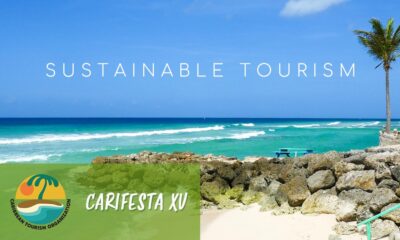– Says Venezuela’s provocations being monitored at the highest levels
– Slams AFC’s latest attempt to undermine national solidarity
Vice President and General Secretary of the People’s Progressive Party (PPP), Bharrat Jagdeo, has assured the Guyanese populace that any act of physical aggression by Venezuela will be met with the appropriate response.
He was at the time responding to questions fielded by media representatives at his press conference on Thursday (March 20, 2025) at Freedom House Georgetown.
Dr Jagdeo told reporters that the matter is being looked at the highest levels of government, including receiving daily attention from Commander in Chief of the Armed Forces, President Irfaan Ali and its international allies. “Those matters relating to the Venezuelan aggression against our country and their threat to our territorial integrity and sovereignty are receiving the attention of the entire government the highest level, at the presidential level, on a daily basis….and we’re working with a number of partners around the world to ensure that any Venezuelan aggression that manifests itself in a physical form would be dealt with appropriately,” he said.
Commander in Chief of the Armed Forces, President Irfaan Ali and its international allies. “Those matters relating to the Venezuelan aggression against our country and their threat to our territorial integrity and sovereignty are receiving the attention of the entire government the highest level, at the presidential level, on a daily basis….and we’re working with a number of partners around the world to ensure that any Venezuelan aggression that manifests itself in a physical form would be dealt with appropriately,” he said.
Most recently, the foreign ministers of the Group of Seven (G7) nations issued a joint statement on March 14, 2025 in support of Guyana – reiterating their call for the restoration of democracy in Venezuela and condemning actions by President Nicolás Maduro’s government that they say undermine democratic principles and regional stability. The foreign Ministers of Canada, France, Germany, Italy, Japan, the United Kingdom, the United States, and the High Representative of the European Union underscored concerns over Venezuela’s internal political situation and they strongly condemned recent actions by Venezuelan naval vessels, which they described as threats to Guyana’s commercial operations. The ministers underscored their commitment to upholding the sovereignty and territorial integrity of all nations, reaffirming these principles as essential to maintaining international order and regional peace. “We reaffirmed respect for the sovereignty and territorial integrity of all nations as an enduring value,” the officials said.
DIVISIVE STATEMENTS
Meanwhile, the recent Alliance for Change (AFC) statement, in which they said that the People’s Progressive Party/Civic (PPP/C) government “has proven time and time again that it has no stomach for a fight with Venezuela and instead chooses gimmickry and falsehoods to hide the reality from the Guyanese people,” has drawn sharp criticism from Dr Jagdeo.
He pointed out that such assertions can be viewed as divisive, potentially undermining the unified stance that Guyana has traditionally upheld in the ongoing border controversy.
Dr Jagdeo reminded that Guyana has historically maintained a bipartisan and unified front on this matter, considering it is a sacred issue of national sovereignty.
To this end, he commended Opposition Leader, Aubrey Norton’s move to respond in a measured manner, during a recent news conference where he addressed questions from the media relating to his discussion with President, Dr Mohamed Irfaan Ali on the border controversy. “I saw someone who understood that sometimes you can’t conduct diplomacy in public, particularly on a sensitive matter like the border issue. It was a very mature position … but you can’t say the same for these lowlifes in the AFC. They will, for anything …destroy the solidarity we have,” he expressed
PLANNED ELECTIONS
Notably, Venezuela has announced that it will soon hold elections in Guyana’s Essequibo region.
When asked about intelligence regarding a Guyanese being appointed governor in the disputed region, the general secretary dismisses it as mere reports from Venezuela, emphasising that Guyana has authority over its own territory. Jagdeo said, “They can call him governor, king, viceroy, monarch, whatever they want to call their people but not in our Essequibo,” he stressed, reminding that any Guyanese who accepts to become governor is a treasonous act.
Jagdeo added, “…these antics by the Venezuelan government… you have to treat it seriously and that is why we took it to the ICJ. We approached the ICJ on the matter of their elections [and] our partners are fully briefed etc. …and Robeson Benn already made it clear – it’s a treason act. Any Guyanese who allows himself to be appointed Governor of Essequibo that includes our territory…it’s a treasonous act.”
Guyana’s Ministry of Foreign Affairs and International Cooperation has since filed a new case at the ICJ, seeking emergency measures to halt Venezuela’s plans to hold an election in Essequibo.
The ICJ is expected to address new requests for provisional measures, given Venezuela’s announcement that it will soon hold elections in Guyana’s Essequibo region. Guyana has argued to the ICJ that the conduct of Venezuelan elections, which are scheduled for 25 May 2025, as well as all preparatory acts in the disputed territory leading to the holding of such elections, would violate “Guyana’s sovereignty, territorial integrity and political independence, as well as the Court’s Order [on the indication of provisional measures] of 1 December 2023”.
INCURSION INTO GUYANA’S WATERS
Venezuela’s recent aggressions occurred on March 1, 2025, around 07:00 hours when Venezuelan Naval Vessel ABV Guaiqueiri sailed approximately 700 metres in Guyana’s exclusive economic zone (EEZ), near FPSO PROSPERITY.
The Venezuelan naval vessel communicated threateningly via radio communication that FPSO PROSPERITY was operating in Venezuela’s EEZ before continuing in a Southwestern direction towards other FPSOs, to which it delivered the same message.
The incursion drew swift condemnation from the Guyanese government, CARICOM, the Organization of American States (OAS), the Commonwealth, and key Western nations, including the US, the UK, and France.
ICJ PROCESS
On 29 March 2018, Guyana filed an Application instituting proceedings against Venezuela with respect to a dispute concerning “the legal validity and binding effect of the Award regarding the Boundary between the Colony of British Guiana and the United States of Venezuela, of 3 October 1899”.
As basis for the jurisdiction of the Court, the Applicant invokes Article IV, paragraph 2, of the “Agreement to Resolve the Controversy between Venezuela and the United Kingdom of Great Britain and Northern Ireland over the Frontier between Venezuela and British Guiana”, signed at Geneva on 17 February 1966, and the decision of 30 January 2018 by which the Secretary-General of the United Nations, in accordance with that Agreement, chose the Court as the means to be used for the settlement of the controversy.
On 18 June 2018, Venezuela informed the Court that it considered that the Court manifestly lacked jurisdiction to hear the case and that it had decided not to take part in the proceedings. The Court then decided to address first the question of its jurisdiction.
In its Judgment delivered on 18 December 2020, the Court found that it had jurisdiction to entertain the Application filed by Guyana in so far as it concerned the validity of the Arbitral Award of 3 October 1899 and the related question of the definitive settlement of the land boundary dispute between Guyana and Venezuela.
Further to the filing of preliminary objections by Venezuela on 7 June 2022, the Court, in its Judgment of 6 April 2023, rejected Venezuela’s preliminary objection concerning the exercise of the Court’s jurisdiction and found that it could adjudicate upon the merits of Guyana’s claims, in so far as they fall within the scope of the Court’s jurisdiction as defined in the operative clause of its Judgment of 18 December 2020.
On 30 October 2023, Guyana filed a Request for the indication of provisional measures due to its concern over the Government of Venezuela’s stated intention to hold a so-called “Consultative Referendum” on 3 December 2023 regarding the purported creation of the State of “Guayana Esequiba” within Venezuela, comprising the territory at issue in the current proceedings.
In its Order of 1 December 2023, the Court stated that, in light of the strong tension that characterized the relations between the Parties, it considered that the conduct of Venezuela — in organizing such a referendum and asserting that it would take concrete action on the basis of the results of that referendum — presented a serious risk of Venezuela acquiring and exercising control and administration of the territory in dispute. The Court therefore directed Venezuela to refrain from taking any action, pending a final decision in the case, which would modify the situation that currently prevails in the territory in dispute, whereby Guyana administers and exercises control over that area.
The Court further instructed both Parties to refrain from any action which might aggravate or extend the dispute or make it more difficult to resolve.


 TCI News1 week ago
TCI News1 week ago
 News5 days ago
News5 days ago
 Bahamas News2 days ago
Bahamas News2 days ago
 News4 days ago
News4 days ago
 Bahamas News1 day ago
Bahamas News1 day ago
 News6 days ago
News6 days ago
 Caribbean News5 days ago
Caribbean News5 days ago
 Health1 day ago
Health1 day ago























